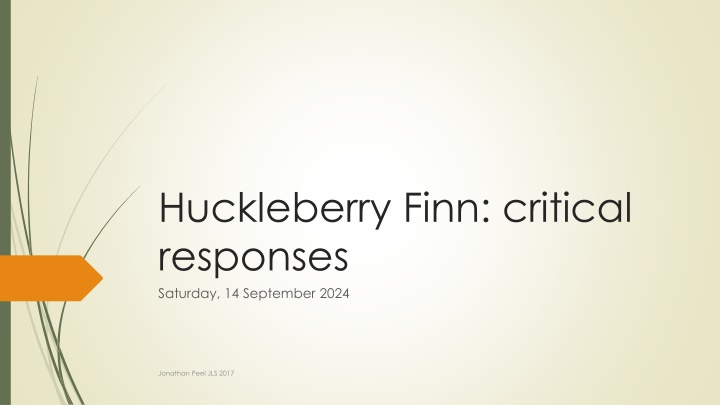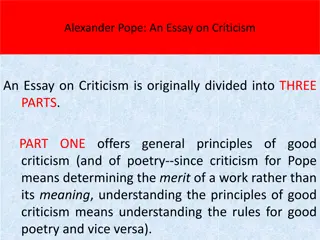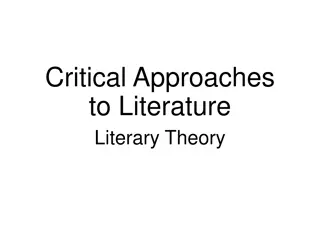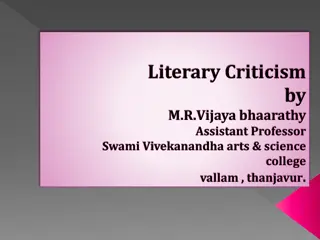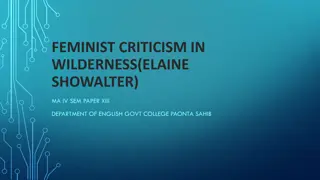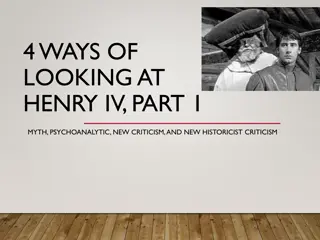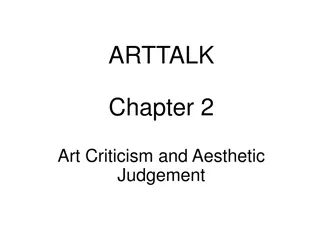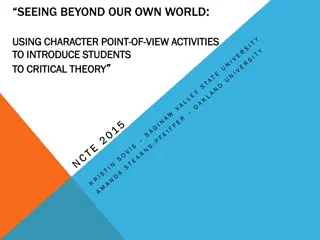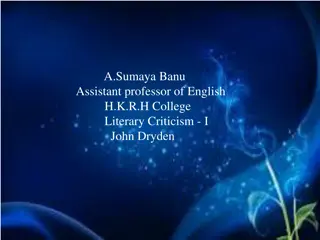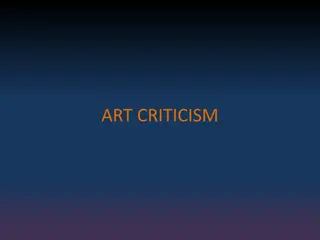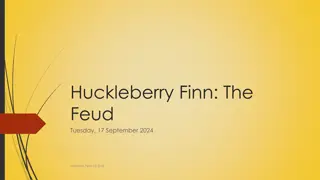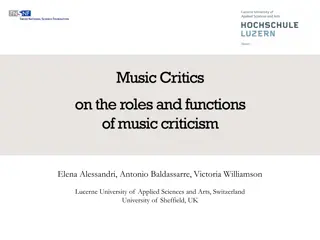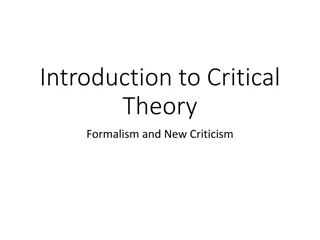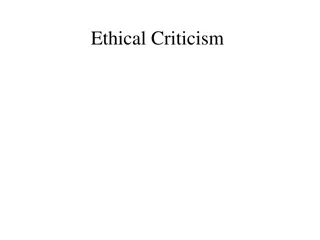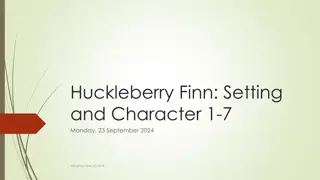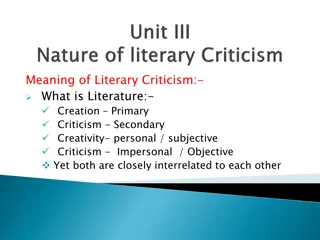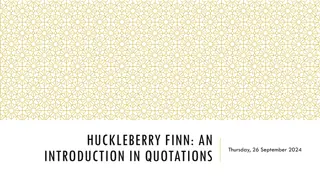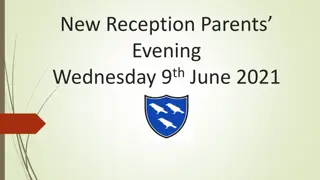Reception and Criticism of "Huckleberry Finn" in the 19th Century
"Huckleberry Finn" faced a mix of reception in the 19th century, with some areas praising it while others criticized its language, humor, and moral tone. The book was banned in Concord but gained popularity in other regions, with critics highlighting its depiction of Southern life along the Mississippi River. Despite controversies, the work's dialect and characters were appreciated by those familiar with Southern culture. Overall, the book sparked varied reactions and discussions during its initial release.
Download Presentation

Please find below an Image/Link to download the presentation.
The content on the website is provided AS IS for your information and personal use only. It may not be sold, licensed, or shared on other websites without obtaining consent from the author.If you encounter any issues during the download, it is possible that the publisher has removed the file from their server.
You are allowed to download the files provided on this website for personal or commercial use, subject to the condition that they are used lawfully. All files are the property of their respective owners.
The content on the website is provided AS IS for your information and personal use only. It may not be sold, licensed, or shared on other websites without obtaining consent from the author.
E N D
Presentation Transcript
Huckleberry Finn: critical responses Saturday, 14 September 2024 Jonathan Peel JLS 2017
Reception: 19th century We know of at least 20 contemporary reviews and over 100 contemporary comments about the book. The book was poorly received in Massachusetts in particular and also was regarded as problematic in New York and Boston. It was well received in other areas of New York and Massachusets as well as in California, Connecticut and Georgia. The book sold very well, especially after the Concord ban of 1885, in Massachusets. concord ban "The directors of the Concord Public Library have joined in the general scheme to advertise MARK TWAIN'S new book, 'Huckleberry Finn.' They have placed it on the Index Expurgatorius, and this will compel every citizen of Concord to read the book in order to see why the guardians of his morals prohibited it." (St. Louis Post-Dispatch on 17 March 1885 in one of the earliest newspaper accounts of the first time Huck Finn was banned). Jonathan Peel JLS 2017
Critical comment for discussion (Newspapers) We are suspicious of every middle-aged person who has nor read Huckleberry Finn; we envy the young person who still has it in store Philadelphia Public Ledger 1896 Jonathan Peel JLS 2017
On the ban The reasons which moved them to this action [the ban] are weighty and to the point. One of the Library Committee, while not prepared to hazard the opinion that the book is "absolutely immoral in its tone," does not hesitate to declare that to him "it seems to contain but very little humor." Another committeeman perused the volume with great care and discovered that it was "couched in the language of a rough, ignorant dialect" and that "all through its pages there is a systematic use of bad grammar and an employment of inelegant expressions." The third member voted the book "flippant" and "trash of the veriest sort." They all united in the verdict that "it deals with a series of experiences that are certainly not elevating," and voted that it could not be tolerated in the public library. The New York Herald 1885: March 18 Jonathan Peel JLS 2017
And comment from the West: San Francisco Chronicle1885: March 29 The action of the Concord Public Library in excluding Mark Twain's new book, "Huckleberry Finn," on the ground that it is flippant and irreverent, is absurd. The managers of this library evidently look on this book as written for boys, whereas we venture to say that upon nine boys out of ten much of the humor, as well as the pathos, would be lost. The more general knowledge one has the better he is fitted to appreciate this book, which is a remarkably careful sketch of life along the Mississippi river forty years ago. If one has lived in the South he can appreciate the art with which the dialect is managed, exactly as he can in Joel Chandler Harris' "Uncle Remus," or in Craddock's Tennessee mountain tales. If he has not he will be forced to take it on trust. So with the characters. They are peculiarly Southern, but only those who have lived south of Mason and Dixon's line can thoroughly appreciate the fidelity to nature with which they have been drawn. When the boy under 16 reads a book he wants adventure and plenty of it. He doesn't want any moral thrown in or even implied; the elaborate jokes worked out with so much art, which are Mark Twain's specialty, are wasted upon him. All the character sketches go for nothing with this eager reader, who demands a story. To be sure, there is a story in the astonishing series of adventures of "Huck" Finn and the runaway negro, but it is so overlaid with this embroidery of jokes, sketches and sarcasm, that the story really forms the least part of it. Take the whole latter part of the book, which is given up to the ludicrous attempt to free the negro, Jim, from his imprisonment on the Arkansas plantation. This is a well-sustained travesty of the escapes of great criminals, and can only be fully appreciated by one who has read what it ridicules. Running all through the book is the sharpest satire on the ante-bellum estimate of the slave. Huckleberry Finn, the son of a worthless, drunken, poor white, is troubled with many qualms of conscience because of the part he is taking in helping the negro to gain his freedom. This has been called exaggerated by some critics, but there is nothing truer in the book. The same may be said of the ghastly feud between the Shepperdsons and the Grangerfords, which is described with so much dramatic force. The latter depicts a phase of Southern life which the advance in civilization has had no power to alter. The telegraphic reports of periodical affrays in the South and Southwest show that the medieval blood-feud is still in force there and receives the countenance of the best society. These are only a few instances which go to show that this is not a boy's book and does not fall under the head of flippant and worthless literature. Of its humor nothing need be said. There is a large class of people who are impervious to a joke, even when told by as consummate a master of the art of narration as Mark Twain. For all these the book will be dreary, flat, stale and unprofitable. But for the great body of readers it will furnish much hearty, wholesome laughter. In regard to the charge of grossness, there is not a line in it which cannot be read by a pure-minded woman. There are too few books of genuine humor produced nowadays to have one of them stigmatized as unfit for general reading, and it is on this ground only that the absurd attack of these New England library authorities is worth notice. Jonathan Peel JLS 2017
Hartford, March 28, 1885. Frank A. Nichols, Esq., Secretary Concord Free Trade Club:-- Dear Sir,--I am in receipt of your favor of the 24th instant, conveying the gratifying intelligence that I have been made an honorary member of the Free Trade Club of Concord, Massachusetts, and I desire to express to the club, through you, my grateful sense of the high compliment thus paid me. It does look as if Massachusetts were in a fair way to embarrass me with kindnesses this year. In the first place, a Massachusetts judge has just decided in open court that a Boston publisher may sell, not only his own property in a free and unfettered way, but also may as freely sell property which does not belong to him but to me; property which he has not bought and which I have not sold. Under this ruling I am now advertising that judge's homestead for sale, and, if I make a good a sum out of it as I expect, I shall go on and sell out the rest of his property. In the next place, a committee of the public library of your town have condemned and excommunicated my last book and doubled its sale. This generous action of theirs must necessarily benefit me in one or two additional ways. For instance, it will deter other libraries from buying the book; and you are doubtless aware that one book in a public library prevents the sale of a sure ten and a possible hundred of its mates. And, secondly, it will cause the purchasers of the book to read it, out of curiosity, instead of merely intending to do so, after the usual way of the world and library committees; and then they will discover, to my great advantage and their own indignant disappointment, that there is nothing objectionable in the book after all. And finally, the Free Trade Club of Concord comes forward and adds to the splendid burden of obligations already conferred upon me by the Commonwealth of Massachusetts, an honorary membership which is worth more than all the rest, just at this juncture, since it indorses me as worthy to associate with certain gentlemen whom even the moral icebergs of the Concord library committee are bound to respect. May the great Commonwealth of Massachusetts endure forever, is the heartfelt prayer of one who, long a recipient of her mere general good will, is proud to realize that he is at last become her pet. Thanking you again, dear sir, and gentlemen, I remain, Your obliged servant, S.L. Clemens. Known to the Concord Winter School of Philosophy as "Mark Twain." Jonathan Peel JLS 2017
Opinion by 1890 Nothing less than a masterpiece : Andrew Lang (Scottish writer and critic) The strongest book which had appeared in our language in its decade : Robert Louis Stevenson A Homeric book for Homeric it is in the true sense, as no other English book is, that I know of : Punch 1896 Our English cousins consider the book Mr Clemens masterpiece, and The Athenaeum has declared it to be one of the six greatest books published in America . : The Critic 1896 Jonathan Peel JLS 2017
Writers on the text: Episodically both HF and TS are magnificent, but as complete works of art they are of quite inferior quality. Mark Twain was always a divine amateur, and he never would or never could appreciate the fact that the most important thing in any work of art is its construction. : Arnold Bennett 1910 Jonathan Peel JLS 2017
T.S. Eliot The Adventures of Huckleberry Finn is the only one of Mark Twain s various books which can be called a masterpiece. I do not suggest that it is his only book of permanent interest; but it is the only one in which his genius is completely realized, and the only one which creates its own category. There are pages in Tom Sawyer and in Life on the Mississippi which are, within their limits, as good as anything with which one can compare them in Huckleberry Finn; and in other books there are drolleries just as good of their kind. But when we find one book by a prolific author which is very much superior to all the rest, we look for the peculiar accident or concourse of accidents which made that book possible. In the writing of Huckleberry Finn Mark Twain had two elements which, when treated with his sensibility and his experience, formed a great book: these two are the Boy and the River. Jonathan Peel JLS 2017
Eliot again. Huck is passive and impassive, apparently always the victim of events; and yet, in his acceptance of his world and of what it does to him and others, he is more powerful than his world, because he is more aware than any other person in it. Repeated readings of the book only confirm and deepen one s admiration of the consistency and perfect adaptation of the writing. This is a style which at the period, whether in America or in England, was an innovation, a new discovery in the English language. Other authors had achieved natural speech in relation to particular characters Scott with characters talking Lowland Scots, Dickens with cockneys: but no one else had kept it up through the whole of a book. Thackeray s Yellowplush, impressive as he is, is an obvious artifice in comparison. In Huckleberry Finn there is no exaggeration of grammar or spelling or speech, there is no sentence or phrase to destroy the illusion that these are Huck s own words. It is not only in the way in which he tells his story, but in the details he remembers, that Huck is true to himself. There is, for instance, the description of the Grangerford interior as Huck sees it on his arrival; there is the list of the objects which Huck and Jim salvaged from the derelict house Jonathan Peel JLS 2017
W.H. Auden The first thing maybe which strikes someone who comes from England [about HF] is the difference in nature and in the attitude to nature [in England] nature is something with which you enter into a semi- personal relation. In the US, nature is altogether more savage; it is almost like St. George and the dragon. Nature is the dragon against which St. George proves his manhood. One is fascinated by the amazing stoicism of this young boy Most Europeans will find the book emotionally very sad. Huck has had a relationship with Jim much more intense than any Oliver [Twist] has known, and yet, at the end of the book, you know they are going to part and never see each other again as if freedom and love were incompatible. Jonathan Peel JLS 2017
V.S. Pritchett The peculiar power of American nostalgia is that it I s not only harking back to something lost in the past, but suggests also the tragedy of a lost future. we see the human wastage that is left in the wake of a great effort of the human will, the hopes frustrated, the idealism which has been whittled down to eccentricity and chance. These people are the price paid for building a new country. a profound reality in human nature: the ability of man to adjust himself to circumstance and to live somehow. Jonathan Peel JLS 2017
American Voices "Huckleberry Finn took the first journey back. He was the first to look back at the republic from the perspective of the west. His eyes were the first eyes that ever looked at us objectively that were not eyes from overseas. There were mountains at the frontier but he wanted more than mountains to look at with his restive eyes--he wanted to find out about men and how they lived together. And because he turned back we have him forever. : F. Scott Fitzgerald "The good writers are Henry James, Stephen Crane, and Mark Twain. That's not the order they're good in. There is no order for good writers.... All modern American literature comes from one book by Mark Twain called 'Huckleberry Finn.' If you read it you must stop where the Nigger Jim is stolen from the boys. That is the real end. The rest is just cheating. But it's the best book we've had. All American writing comes from that. There was nothing before. There has been nothing as good since. : Ernest Hemingway Jonathan Peel JLS 2017
"We are aware that Huck cannot live comfortably in any of the worlds he inhabits. He searches for a father he cannot find, having killed, at least symbolically, the legal one. He cannot find a home, at Widow Douglas's, in Pap's cabin, on Jackson's Island, at the Grangerfords, on the raft, or at the Phelps plantation, either because none of his worlds is insulated from outside interference or because he loses them to circumstance or expediency. The entire structure of the novel is one of frustrated attempt to escape from restrictions only to find the refuge susceptible to invasion and destruction. Judith Loftus's husband is 'after us'; the slave-hunters and the Duke and Dauphin violate the pastoral immunity of the raft; Tom Sawyer appears at the Phelpses to orchestrate an attempt at freedom. : Hamlin Hill (1985) Jonathan Peel JLS 2017
William Faulkner Twain has never really written a novel. His work is too loose. His work is a mass of stuff just a series of events . Twain was the first truly American writer , and all of us since are his heirs. We are descended from him. Before him, the writers who were considered American were not, really; their tradition, their culture was European culture . Jonathan Peel JLS 2017
Norman Mailer : Twains modernism. That was how it felt to read ''Huckleberry Finn'' a second time. I kept resisting the context until I finally surrendered. One always does surrender sooner or later to a book with a strong magnetic field. I felt as if I held the work of a young writer about 30 or 35, a prodigiously talented fellow from the Midwest, from Missouri probably, who had had the audacity to write a historical novel about the Mississippi as it might have been a century and a half ago, and this young writer had managed to give us a circus of fictional virtuosities. In nearly every chapter new and remarkable characters bounded out from the printed page as if it were a tarmac on which they could perform their leaps. The author's confidence seemed so complete that he could deal with every kind of man or woman God ever gave to the middle of America. Jail-house drunks like Huck Finn's father take their bow, full of the raunchy violence that even gets into the smell of clothing. Gentlemen and river rats, young, attractive girls full of grit and ''sand,'' and strong old ladies with aphorisms clicking like knitting needles, fools and confidence men - what a cornucopia of rabble and gentry inhabit the author's river banks. It would be superb stuff if only the writer did not keep giving away the fact that he was a modern young American working in 1984. His anachronisms were not so much in the historical facts - those seemed accurate enough - but the point of view was too contemporary. The scenes might succeed - say it again, this young writer was talented! - but he kept betraying his literary influences. The author of ''The Adventures of Huckleberry Finn'' had obviously been taught a lot by such major writers as Sinclair Lewis, John Dos Passos and John Steinbeck; he had certainly lifted from Faulkner and the mad tone Faulkner could achieve when writing about maniacal men feuding in deep swamps; he had also absorbed much of what Vonnegut and Heller could teach about the resilience of irony. If he had a surer feel for the picaresque than Saul Bellow in ''Augie March,'' still he felt derivative of that work. In places one could swear he had memorized ''The Catcher in the Rye,'' and he probably dipped into ''Deliverance'' and ''Why Are We in Vietnam?'' He might even have studied the mannerisms of movie stars. You could feel traces of John Wayne, Victor McLaglen and Burt Reynolds in his pages. The author had doubtless digested many a Hollywood comedy on small-town life. His instinct for life in hamlets on the Mississippi before the Civil War was as sharp as it was farcical, and couldn't be more commercial. Jonathan Peel JLS 2017
Race Meanwhile, Jim, as Twain presents him, is hardly a caricature. Rather, he is the moral center of the book, a man of courage and nobility, who risks his freedom -- risks his life -- for the sake of his friend Huck. Note, too, that it is not just white critics who make this point. Booker T. Washington noted how Twain "succeeded in making his readers feel a genuine respect for 'Jim,'" and pointed out that Twain, in creating Jim's character, had "exhibited his sympathy and interest in the masses of the negro people." The great black novelist Ralph Ellison, too, noted how Twain allows Jim's "dignity and human capacity" to emerge in the novel. Huckleberry Finn knew, as did Mark Twain [Ellison wrote], that Jim was not only a slave but a human being [and] a symbol of humanity . . . and in freeing Jim, Huck makes a bid to free himself of the conventionalized evil taken for civilization by the town" -- in other words, of the abomination of slavery itself. http://www.salwen.com/mtrace.html https://www.washingtonpost.com/archive/opinions/1996/01/14/rethinking-huck/60843355-b00d-4d8a- 87a4-76d36436b077/?utm_term=.522033bf0aed https://www.theguardian.com/books/2015/dec/14/school-stops-teaching-huckleberry-finn-community- costs-n-word (on modern banning in the US education system) Jonathan Peel JLS 2017
